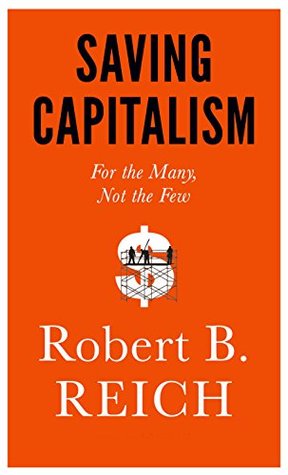More on this book
Community
Kindle Notes & Highlights
Read between
August 15 - September 3, 2018
There can be no “free market” without government. The “free market” does not exist in the wilds beyond the reach of civilization. Competition in the wild is a contest for survival in which the largest and strongest typically win.
PROPERTY: what can be owned • MONOPOLY: what degree of market power is permissible • CONTRACT: what can be bought and sold, and on what terms • BANKRUPTCY: what happens when purchasers can’t pay up • ENFORCEMENT: how to make sure no one cheats on any of these rules
The supposed freedom of contract is a cruel joke to workers who have no alternatives but to agree to terms mandating arbitration of all grievances before an arbiter chosen by the company, thereby forcing employees to give up their constitutional right to a trial.
“Free enterprises” designed to maximize shareholder returns have been known to harm the environment, endanger the health and safety of consumers and others, and defraud investors.
The freedom of enterprises to monopolize a market likewise reduces the freedom of consumers to choose.
Most of us remain “free” in the limited sense of not being coerced into purchasing Internet services or drugs. We can choose to do without them. But this is a narrow view of freedom.
Partly because antitrust enforcement has lost sight of one of its original goals: preventing large aggregations of economic power from gaining too much political influence.
If property and market power lie at the heart of capitalism, contracts are its lifeblood—the means by which trades are made and enforced.
of 20 to 1 in 1965, to 30 to 1 in 1978, 123 to 1 in 1995, 296 to 1 in 2013, and over 300 to 1 today. Overall, CEO pay climbed 937 percent between 1978 and 2013, while the pay of the typical worker rose just 10.2 percent.
But in 1982, John Shad, the new chairman of the SEC, appointed by Ronald Reagan, removed these restrictions.
Then, in 1993, the Clinton administration decided to allow companies to deduct from their taxable income executive pay in excess of $1 million if that pay was linked to corporate performance—that is, if it came in the form of stock options and awards linked to share prices. Not surprisingly, stock options thereafter boomed.
The 1993 provision allowing corporations to deduct from their tax bills executive compensation in excess of $1 million if tied to company “performance” soon became a sham.
They are behaving entirely rationally within this system, although the aggregate consequence of their individually rational calculations is neither efficient nor otherwise rational for the system as a whole. To
“We can have a democracy or we can have great wealth in the hands of a few,” he said, “but we cannot have both.” America made the choice. Public
The richest four hundred Americans have more wealth than the bottom 50 percent of Americans put together; the wealthiest 1 percent own 42 percent of the nation’s private assets; and the share of wealth held by the lower half of households has fallen from 3 percent in 1989 to 1 percent
In 1978, the typical household in the wealthiest 0.01 percent was 220 times richer than the average household. By 2012, the household at the top was 1,120 times richer. Since 2000, adjusted for inflation, the weekly earnings of full-time wage and salary workers at the median have dropped, and average hourly wages adjusted for inflation are lower than they were forty years ago.
In the 2012 elections, for example, the Koch brothers’ political network alone spent more than $400 million. This sum was more than twice the political spending of the ten largest labor unions put together.
That same year corporations spent fifty-six dollars on lobbying for every dollar spent by labor unions.
Republican senator Ted Cruz, another presidential aspirant, has accused the “rich and powerful, those who walk the corridors of power,” of “getting fat and happy.”


